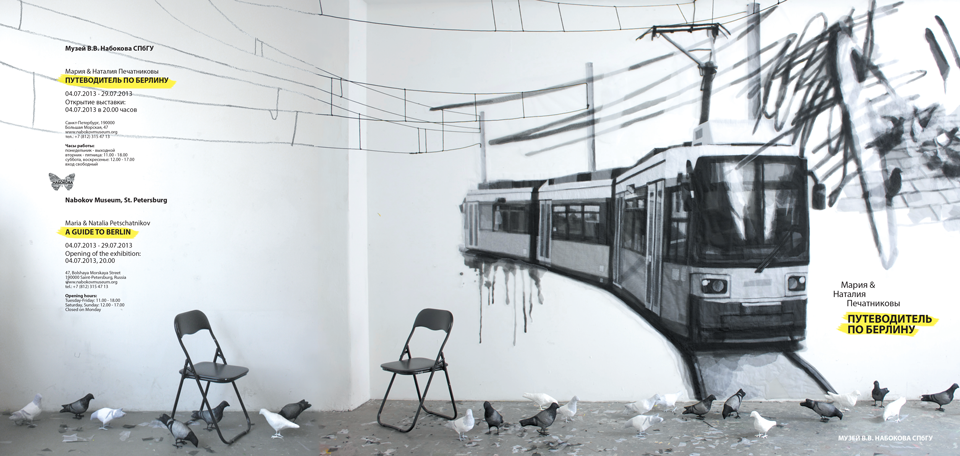I think that here lies the sense of literary creation - to portray ordinary objects as they will be reflected in the kindly mirrors of future times …
Vladimir Nabokov, A Guide to Berlin, 1925
In Maria and Natalia Petschatnikov’s installation A Guide to Berlin, what at first appears to be a strikingly visual collage of heterogeneous motifs from a street scene - with trams, graffiti, pigeons, and the like - turns out to be also an exploration of the destabilizing effects of exile and loss. Taking their cue from their fellow Russian Vladimir Nabokov’s short text “A Guide to Berlin” from 1925, which playfully bypasses grandiose tourist sites in favor of icons of the humble and everyday - trams, pubs, street pipes - the artists create a reconfigurable installation that both pays homage to Nabokov’s icons and builds a new vocabulary of neglected markers of Berlin’s present. Nabokov, who lived in Berlin from 1922 to 1937 and wrote all his Russian novels here, was an “outsider” who paid attention to Berlin’s real “insiders” - things and places that are mostly overlooked. He might even be a passenger on one of the two large trams entering the exhibition space of A Guide to Berlin, which manage to seem friendly and ominous at the same time. The Petschatnikovs’ trams, wending their way out of the past and headed into an unknown future, remind us that we are all, natives and exiles alike, only in transit through this life. But their most brilliant - and Nabokovian - gesture is that the entire installation is a trompe l’oeil: the images, which appear to be drawn on the wall in charcoal, are actually made of tulle, sewn into large pieces that can be hung in various ensembles with more or less visual coherence depending on the site, thus subtly referencing the exile’s necessarily provisional relationship to his or her environment. In linking their tenancy as Russians in Berlin to their Petersburgian predecessor’s, the Petschatnikovs’ masterful delivery of visual delight invests ephemera with the eternal and asks us to reconsider our relationship to the world we encounter around us every day.
Donna Stonecipher is an American poet, author of "The Cosmopolitan" among others. She lives in Berlin.

